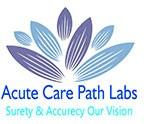Biochemistry
Biochemistry seeks to describe the structure, organization, and functions of living matter in molecular terms. Biochemistry focuses on processes happening at a molecular level.
Clinical Pathology
Clinical pathology covers a wide range of laboratory functions and is concerned with the diagnosis, treatment, and prevention of disease. Clinical pathologists are healthcare providers with special training who often direct all of the special divisions of the lab.
Cytogenetics
Cytogenetics is the branch of genetics that studies the structure and behavior of chromosomes and their relation to human disease and disease processes. Cytogenetic analyses are commonly performed during pregnancy.
Immunoassays
Immunoassays are chemical tests used to detect or quantify a specific substance, the analyte, in a blood or body fluid sample, using an immunological reaction. Immunoassays are highly sensitive and specific.
Microbiology
Microbiology is the study of microscopic organisms, such as bacteria, viruses, archaea, fungi and protozoa. This discipline includes fundamental research on the biochemistry, physiology, cell biology, ecology, evolution.
Histopathology
Histopathologists work in the laboratory, both in partnership with laboratory scientists and doctors from other clinical specialties. They have an in-depth knowledge of both pathological and clinical aspects of disease.
Hematology
Hematology is practised by specialists in the field who deal with the diagnosis, treatment and overall management of people with blood disorders ranging from anemia to blood cancer.






